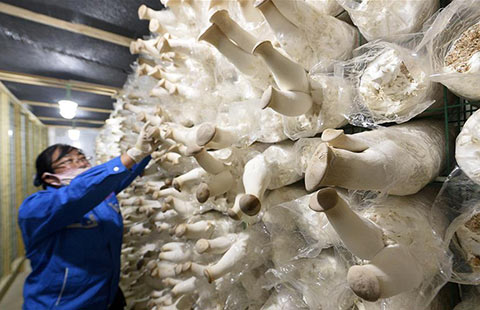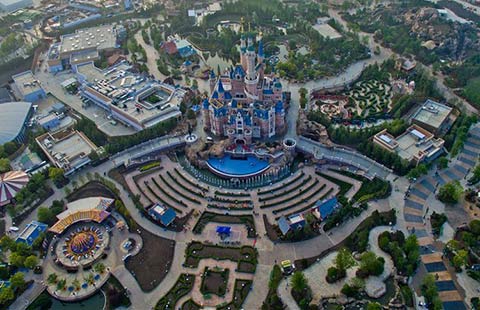The pillars that shaped China's economic success
By WU YUNHE (China Daily) Updated: 2015-05-27 08:27How have Chinese businessmen become successful?
I believe it boils down to three key pillars of the economic reform over the past 30 years.
The first is the "world's factory" role that China has played.
Thanks to the country's opening-up policy and the influx of overseas investment, many private companies grasped the opportunity to take advantage of cheap labor costs to realize a rapid accumulation of wealth which helped send their products around the world.
He Xiangjian, for example, was just an ordinary person from Shunde city, Guangdong province, in 1980, when he joined 23 other local residents and invested a total of just 5,000 yuan ($815) to start an electric-fan factory.
Now 73 years old, the founder of electrical appliance manufacturer Midea Group, one of the world's leading producers of household goods, has personal assets of around 51 billion yuan. He was listed in February among the top 10 of the Hurun China Rich List.
Another great example of someone accumulating wealth fast through global success is Lu Guanqiu, chairman of the board of directors of Zhejiang Wanxiang Group.
In 1969, Lu started a township enterprise in cooperation with six other local farmers in Xiaoshan, Zhejiang province. His wealth had reached 13.1 billion yuan as early as 2007.
Last year, Wanxiang Group bought United States-based Fisker Automotive Inc for $149.2 million, and the company is now well on its way to become one of the globe's leading producers of environmentally friendly automobiles.
The second key economic pillar was the role played by local governments and investors in commercializing the property sector and privatizing the sector's related industries at the turn of the century, which has ultimately led to skyrocketing house prices, and fortunes in some cases.
By 2013, property prices in China had soared to their highest level in history.
Nearly half of China's super-rich are property entrepreneurs, including Wang Jianlin, chairman of Dalian Wanda Group, whose wealth is believed to have hit around 166 billion yuan.
Wang became an official in the Dalian municipal government in 1986 after graduating from Liaoning University.
He launched his own property business three years later, and within four years he was chairman and president of Dalian Wanda Group.
Thanks to the recent bullish stock markets, the performance of his public company, listed on both the A-share and H-share markets, has helped his personal wealth surpass that of Hong Kong tycoon Li Ka-shing, and he is now Asia's richest man.
And last but not least of the three pillars is the country's rise in technology which has created a new generation of companies that have now truly taken their place as giants on a world stage.
The country's four largest tech firms, Alibaba Group Holding Ltd, Tencent Holdings Ltd, Huawei Technologies Co Ltd and Lenovo Group Ltd, have become household names. And they are largely known worldwide because of their success in popularizing the Internet in China.
By the end of last year, the country's number of Internet users hit 649 million, making up 47.9 percent of the population, according to a China Internet Network Information Center report.
Jack Ma, who founded Alibaba in 1999 in Hangzhou, Zhejiang province, is now believed to be worth around 146 billion yuan.
This is a man who failed to pass his college entrance examinations twice before being admitted by Hangzhou Normal University to study English.
After graduation in 1988, he became an English teacher at an electronics college in Hangzhou, where the experience helped him make up his mind to go into electronics... and the rest, as they say, is history.
His e-commerce platform, Taobao.com, has helped countless small Chinese business people realize their dreams too, by being able to sell everything from cosmetics to Christmas gifts and family necessities, around the world.
It was the likes of Rockefeller and Ford who helped forge the United States' economic miracle over a century ago.
With China now closing in on the US to become the world's biggest economy, the next century may well belong to Jack Ma, Wang Jianlin or He Xiangjian.
They have built world-beating companies which have led China overseas and created thousands of domestic and international jobs.
Ma, Wang and He are all exceptional entrepreneurs from humble beginnings, and through their achievements in what has been a remarkably short space of time, China's economy and many of our lives will be shaped for decades to come.
- China hastens fiscal spending to boost economy
- Positive signs emerge for economy during Q2
- Li Wei: China and Japan Should Strengthen Partnership on Economy and Trade in the New Normal
- China expands asset securitization to boost real economy
- UDZ becomes circular economy demonstration site
- China economy loses more steam in April, more stimulus on the cards
- Quotable quotes on China's April exports, imports data
- China stocks plunge again as hopes for economic recovery fade
- Texas pipe plant to boost Chinese FDI
- Coach seeks to beat European brands
- BMW looks to young for China's future
- Lensman Jason Bell sees China as land of creative fashion ideas
- NEV plans get a head start
- Telecom operators saved subscribers $6b by boosting internet speed, cutting fees

















